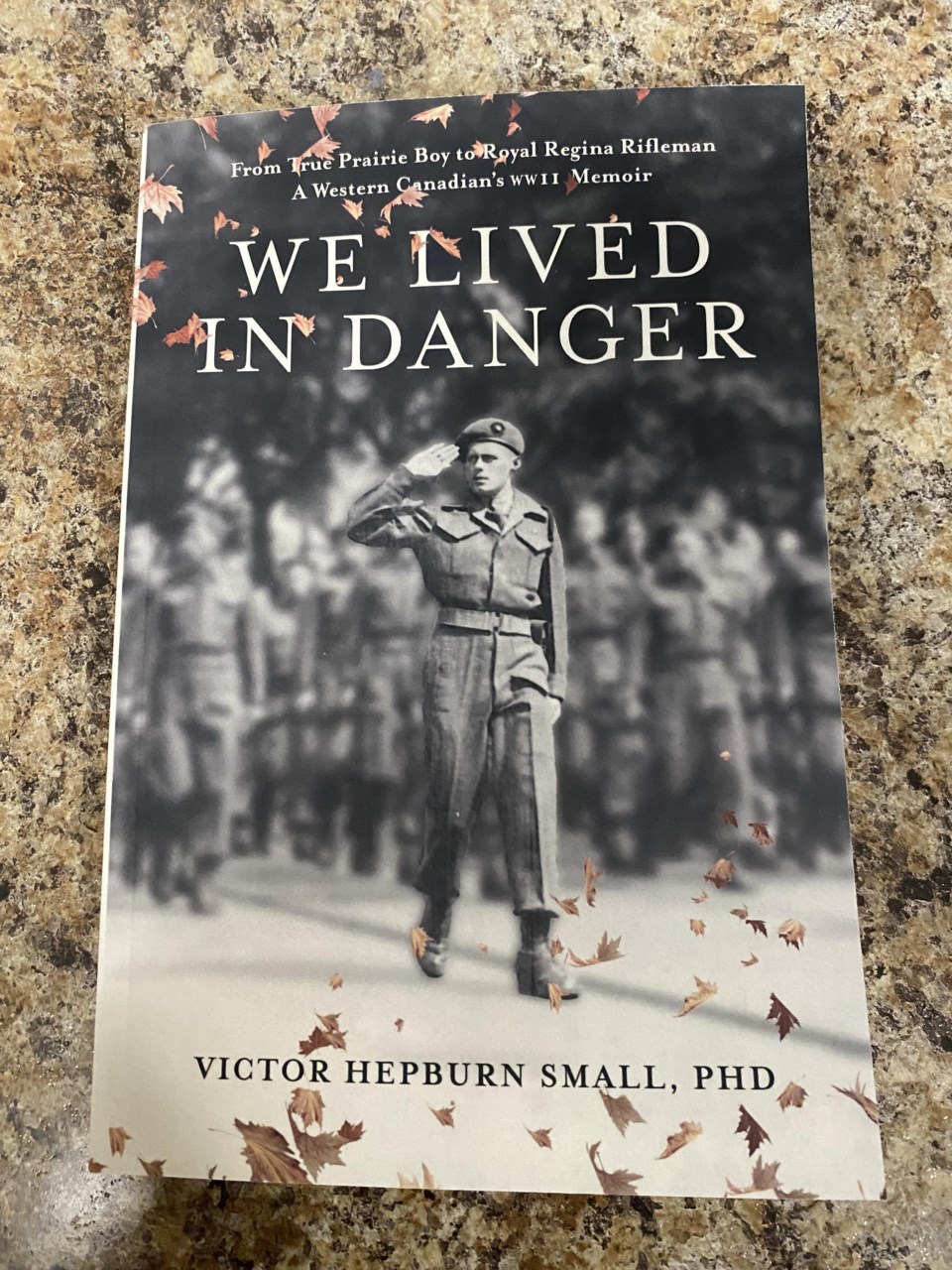YORKTON - The memoir of a man with ties to Yorkton and area has been published.
We Lived in Danger, From Pure Prairie Boy to Royal Regina Rifleman: A Western Canadian’s WWII Memoir was written by, the late Victor Hepburn Small, who was born in Melville.
In 1924, and at age 10, he moved with his family to Yorkton, graduating from Yorkton Collegiate in 1943, and joined the infantry soon after.
“Vic finished writing his WWII memoir in Maryland, in 2020,” said he widow Joanne Wolf Small, who published the book after her husband’s death in 2021.
When asked what had led her husband to write the book Wolf Small referred to the book’s introduction where he had written: “I wrote this memoir to document and share my experience as a young Canadian soldier serving in Europe during the years 1943 to 1946. My history includes family letters I wrote, and photographs taken during my service (preserved over sixty years), my biographical family history authored in 2013, and eight emails and additional letters created between the years 2009 and 2015, further recollecting my combat experience.”
Expanding on why he chose to write a memoir Wolf Small said, “Vic nearly made it to his 97th birthday, and if not for that reality, I can say with certainty it is unlikely ‘We Lived in Danger’ would ever have been written, and here is why.
”As time goes by, we tend to lose acquaintances, dear friends, and family members. Even though the research on aging tells us contact with these significant relationships becomes vital to our well being.
“So, I asked Vic if he would like me to see if there were any surviving RRR WWII veterans left. And if so, could we try and contact them. He agreed, and on his behalf, I googled RRR. I was delighted to find not just that the unit was still active, but also information on how I could directly connect with them.
“Fortunately, reconnecting with the associations led to email exchanges and phone discussions and to J. Walter Keith, who recalled in ‘Look to your Front’ that he and Victor had been billeted together with the same Dutch family in the Netherlands.
“Then around 2020 I found that the US Library of Congress sponsored a WWII Veteran’s History Project. The project supplied us with sample interview questions, ideas for headings, and a general outline. Vic agreed to answer the questions, and the rest is history.”
While completed just before his death, the book was actually a much longer term project, having been begun about 11 years earlier, when efforts to connect to living WWII veterans and members of the Royal Regina Regiment (RRR) led to his first finding Dolores Hatch, a World War II historian, added Wolf Small.
Naturally the military features in the book.
“Vic entered the military after his graduation from Yorkton Collegiate Institute,” said Wolf Small via email.
However he did have a career post service too.
“After returning home, he chose to attend the College of Optometry Ontario graduating with an optometry degree in 1949. He then joined his father’s optometry practice in Yorkton,” said Wolf Small. “Eventually, he became interested in how children’s vision problems contributed to their learning to read. This interest led him to obtain a Ph.D. in experimental psychology from the Perdue University in Lafayette, Indiana, and a career working as a psychologist with school age children.”
Wolf Small said taking on the publication of the book was something that seemed just a natural thing to do.
“Vic and I had decided by 2020, with the use of a computer and copies of photos, and a printer, that we could publish the manuscript for our family.” She explained. “It was not until his death in April of 2021, that I realized I might need the help of an Indie book publishing company to proceed. Even if I only published it for our family.
“I did some research and found what I considered a reliable Indie publisher. I discussed what I wanted with the chief editor. And though I didn’t feel ready at that time to proceed, she sent me a newsletter with general self-publishing advice. like find a good, professional copy-editor.
“Eventually I found someone I considered an ideal copy-editor for Vic’s manuscript, and then found a professional interior and exterior book designer.
“Those choices, and the amount of positive feedback I was getting as I kept on, helped me decide to proceed with publishing Vic’s book.”
Certainly for Wolf Small the book is deeply personal.
“Some of it I read while it was being written,” she said. “I discovered more leave letters after his passing and wanted those included. His is a deeply personal story! I didn’t meet Vic until 1960.
“What so deeply impressed me is that I ‘heard his voice’ even when reading leave letters, he wrote home when he was 18, 19, 20, 21 years old. How is that for authenticity!”
For area readers Yorkton and Melville feature prominently as Wolf Small noted there are “lots of stories” relating to the area.
“Vic just loved Saskatchewan. And I believe his stories make that very clear.”
So does Wolf Small have a favourite story from with the pages of the memoir?
“If I had to pick one, and it would probably be the one about harvest time, how people worked together, about the grain elevators, how they worked, and about growing different kinds of wheat,” she said.
The book can be found via www.welivedindanger.com






